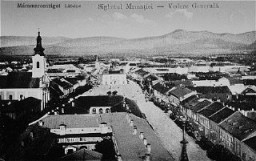You searched for: 网络推广app【TG飞机:@bapingseo】布隆迪facebook竞价【TG电报:@bapingseo】红绿程序平台源码【Telegram:@bapingseo】满堂彩1.98邀请码万博买球app靠谱吗亚博平台官网中原1分快3彩票?20220707pT4i6v.html
<< Previous | Displaying results 771-780 of 825 for "网络推广app【TG飞机:@bapingseo】布隆迪facebook竞价【TG电报:@bapingseo】红绿程序平台源码【Telegram:@bapingseo】满堂彩1.98邀请码万博买球app靠谱吗亚博平台官网中原1分快3彩票?20220707pT4i6v.html" | Next >>
-
Lucine Horn describes conditions in the Lublin ghetto
Oral HistoryLucine was born to a Jewish family in Lublin. Her father was a court interpreter and her mother was a dentist. War began with the German invasion of Poland on September 1, 1939. Lucine's home was raided by German forces shortly thereafter. Soon after the German occupation of Lublin, Jews there were forced to wear a compulsory badge identifying them as Jews. A ghetto in Lublin was closed off in January 1942. Lucine survived a series of killing campaigns and deportations from the ghetto during March and…
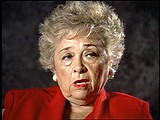
-
Ludmilla Page describes conditions in Oskar Schindler's munitions factory in Brünnlitz
Oral HistoryLudmilla was born to an assimilated Jewish family in Kishinev, Romania. She and her mother, a physician, were living in Poland when the Germans invaded on September 1, 1939. They were taken to Krakow. Ludmilla was forced to live in the Krakow ghetto; her mother was sent to the Warsaw ghetto. Ludmilla worked in a factory at the Plaszow labor camp for a businessman who was a friend of the German industrialist Oskar Schindler. In October 1944, Schindler attempted to save some Jewish workers by relocating them…
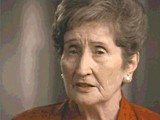
-
Charlene Schiff describes a clandestine school for children in the Horochow ghetto
Oral HistoryBoth of Charlene's parents were local Jewish community leaders, and the family was active in community life. Charlene's father was a professor of philosophy at the State University of Lvov. World War II began with the German invasion of Poland on September 1, 1939. Charlene's town was in the part of eastern Poland occupied by the Soviet Union under the German-Soviet Pact of August 1939. Under the Soviet occupation, the family remained in its home and Charlene's father continued to teach. The Germans…
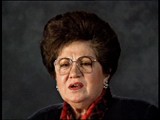
-
Charlene Schiff describes the German invasion of her town, Horochow, in the summer of 1941
Oral HistoryBoth of Charlene's parents were local Jewish community leaders, and the family was active in community life. Charlene's father was a professor of philosophy at the State University of Lvov. World War II began with the German invasion of Poland on September 1, 1939. Charlene's town was in the part of eastern Poland occupied by the Soviet Union under the German-Soviet Pact of August 1939. Under the Soviet occupation, the family remained in its home and Charlene's father continued to teach. The Germans…
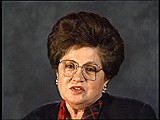
-
Charlene Schiff describes foraging for food in order to survive in forests after escaping from the Horochow ghetto
Oral HistoryBoth of Charlene's parents were local Jewish community leaders, and the family was active in community life. Charlene's father was a professor of philosophy at the State University of Lvov. World War II began with the German invasion of Poland on September 1, 1939. Charlene's town was in the part of eastern Poland occupied by the Soviet Union under the German-Soviet Pact of August 1939. Under the Soviet occupation, the family remained in its home and Charlene's father continued to teach. The Germans…
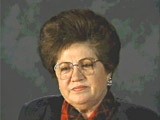
-
Siegfried Halbreich describes conditions and forced labor in the Gross-Rosen camp
Oral HistoryAfter Germany invaded Poland on September 1, 1939, Siegfried fled with a friend. They attempted to get papers allowing them to go to France, but were turned over to the Germans. Siegfried was jailed, taken to Berlin, and then transported to the Sachsenhausen camp near Berlin in October 1939. He was among the first Polish Jews imprisoned in Sachsenhausen. Inmates were mistreated and made to carry out forced labor. After two years, Siegfried was deported to the Gross-Rosen concentration camp, where he was…
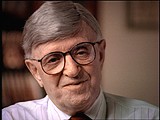
-
Writing the News
ArticleShortly after taking power in January 1933, Adolf Hitler and the Nazis took control of German newspapers, detailing how the news was to be reported.
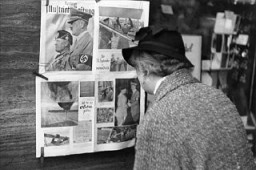
-
The Order Police
ArticleThe Order Police (Ordnungspolizei, Orpo) were Nazi Germany’s uniformed police forces. They became perpetrators of horrific crimes and played a significant role in the Holocaust.
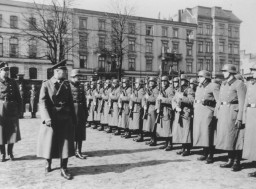
-
Charles E. Coughlin
ArticleCharles Coughlin, Catholic priest and populist leader, promoted antisemitic and pro-fascist views. In the 1930s, he was one of the most influential public figures in the US.
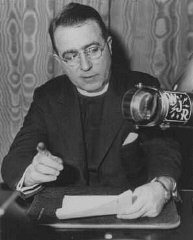
-
Sighet
ArticleLearn about the history of Sighet, birthplace of Elie Wiesel. The Jewish population of Sighet was deported to Auschwitz in May 1944. Most of the deportees were gassed on arrival.
